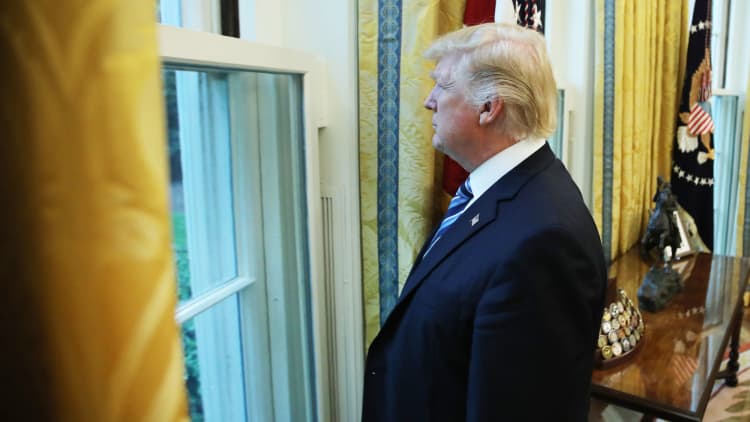
What distinguished Donald Trump's presidential campaign was not just the scale of his promises, which included obliterating ISIS, replacing Obamacare, building a wall with Mexico's money and super-charging economic growth.
Candidate Trump also insisted that, by force of his negotiating skill, he could fulfill those vows quickly where predecessors had failed. When I reminded him in a Speakeasy interview that America doesn't have Superman presidents, he replied jauntily: "You will if you have Trump. You watch."
If his first 100 days have made anything clear it is this: That wasn't true.
In the Oval Office, in fact, Trump looks less like Superman and more like Professor Marvel in that "Wizard of Oz" scene when Dorothy peers behind the curtain to see that Oz isn't so great and powerful after all. Trump is a talented salesman with the world's biggest microphone, but he has no experience making government work and precious few aides to help him learn how.
Every chief executive, from George Washington through Barack Obama, has found frustrations in office. Limits on presidential power are inherent in America's constitutional system of checks and balances.
Yet, Trump has hit those limits with astonishing speed across multiple fronts.
His executive orders to bar travelers from certain majority-Muslim countries and strip federal funds from "sanctuary cities" have been blocked by judges. His demand for a House vote to repeal and replace Obamacare was rejected by fellow Republicans.
When lawmakers from both parties balked at his call to finance a border wall, he gave in. Facing resistance from business, he decided not to terminate the North American Free Trade Agreement and to let the Export-Import Bank live on.
The president declared NATO "no longer obsolete" as he had earlier insisted, admitting he knew little about the subject then. He abandoned his pledge to declare China a currency
Pyongyang's nuclear program has not been halted. ISIS has not been wiped out.
Just as significant, the inexperienced president leans on inexperienced top advisors, including his daughter and son-in-law, and not many advisors at that. Of the 556 executive branch jobs important enough to require Senate confirmation, only 24 have been filled. Trump hasn't nominated anyone for 468 of them, according to the running tab kept by the Partnership for Public Service.
The juxtaposition of grandiose claims with an inability to deliver has eroded Trump's public standing, which was historically weak from the outset. In this week's NBC News/Wall Street Journal Poll, the share of Americans who approve his job performance fell to 40 percent, down from 44 percent in February. Just 27 percent praise him for having the knowledge needed to handle the presidency, 25 percent for honesty, 21 percent for temperament.
Trump retains the support of 8 in 10 rank-and-file Republicans. That backing, which reinforces historically high levels of partisan solidarity in a Congress that Republicans control, means that the president retains the capacity to achieve important objectives requiring majority votes. The presidency gives him substantial powers to act independently, especially in the realm of foreign policy.
But Trump's first 100 days, for all his braggadocio, have offered one demonstration after another that he has not repealed the laws of political physics. Most voters backed another candidate last November and still disdain him. Wall Street, Silicon Valley and the rest of corporate America do not support an inward economic nationalism that disrupts global trading arrangements.
The judiciary sees constitutional constraints binding a president differently than the president does. Other politicians don't want to face rising numbers of needy constituents without health insurance. Trump cannot compel foreign leaders — either allies or adversaries — to take actions they don't believe serve the interests of their nations.
All of that just makes him like any other American president — but one with little preparation for the burdens of political leadership. The success of his term's remaining 1,361 days depends on how well he adjusts to that reality.


